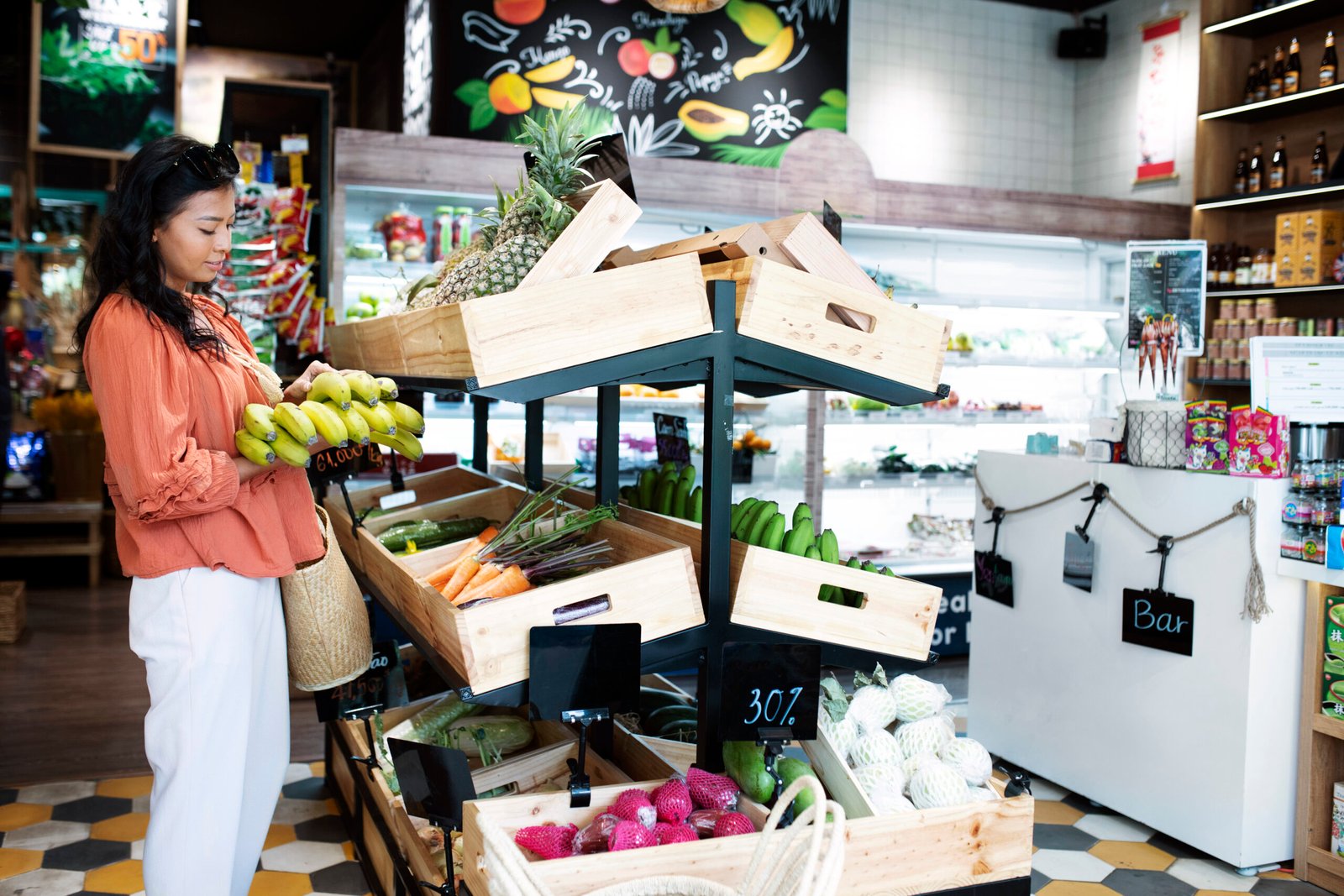How Custom Apps Help Health Food Stores Deliver Better Service
Introduction
In today’s fast-paced digital age, demand for health-conscious products is skyrocketing. As more people strive to live healthier lifestyles, health food retailers are experiencing an increase in consumer demand. However, as rivalry in the health food business heats up, it becomes critical for these retailers to investigate novel solutions that set them apart from the competitors. One such innovation is the usage of customized apps designed exclusively for health food stores. These apps not only improve service delivery but also the whole client experience, allowing businesses to remain competitive and grow. In this detailed guide, we will look at how bespoke applications can help health food retailers provide better service and fulfill the changing needs of their customers.
Why Custom Apps Are Vital for Health Food Stores
The Rise of the Health-Conscious Consumer
The number of health-conscious consumers has increased dramatically in recent years, as more people understand the value of healthy, natural, and organic goods. Health food stores cater to this rising clientele, and specialized apps allow them to provide a more convenient and tailored shopping experience. Stores can tap into this growing market and increase access to health-focused merchandise by making it simple for customers to browse, learn about, and purchase things from their smartphones.
Growing Competition in the Health Food Market
With the growing popularity of health foods, competition among retailers has expanded dramatically. Everyone, from small local businesses to major chains, is vying for the attention of health-conscious customers. In such a congested market, health food businesses must provide more than just items; they must also provide a consistent and compelling consumer experience. Custom applications can help a store stand out in a competitive market by providing unique features like personalized product recommendations, exclusive in-app promotions, and more.
Meeting Customer Expectations
Modern consumers have high expectations for digital experiences. They want more than just the ability to order things online; they also want detailed information, speedy delivery, and personalized shopping recommendations. Custom apps help health food stores satisfy these expectations by delivering an easy, responsive platform that improves the purchasing experience. Health food stores may encourage long-term loyalty and happiness by exceeding client expectations with features targeted to their specific needs.
Features of Custom Apps for Health Food Stores
Easy-to-Navigate Interface
A custom app created for health food retailers should prioritize simplicity and use. Customers should be able to find products quickly and easily, browse between categories, and obtain information without effort. An easy-to-navigate interface lowers friction during the buying process, preventing shoppers from becoming frustrated and abandoning their carts. Health food retailers may enhance sales and user engagement by providing a simple, intuitive experience.
Product Catalog with Detailed Descriptions
Before making a purchasing decision, health-conscious buyers frequently seek out particular nutritional facts, ingredient lists, and health benefits. Custom apps can give comprehensive product catalogs with thorough descriptions, allowing buyers to make more educated decisions. Customers trust this level of transparency, which increases their likelihood of returning for future purchases. Detailed product information also helps educate customers, advocating healthier choices and encouraging them to explore the store’s options.
Personalized Recommendations
One of the most effective aspects of bespoke apps is their ability to provide personalized recommendations based on the user’s interests and purchasing history. Apps can recommend products based on previous orders and browsing behavior, as well as the customer’s nutritional demands, lifestyle goals, or previous purchases. This not only improves the customer experience, but it also raises the possibility of cross-selling and upselling by introducing customers to new products they might not have discovered on their own.
Seamless Payment Options
A smooth and secure checkout procedure is critical to ensure that customers complete their transactions. Custom apps can include a variety of payment alternatives, such as credit cards, mobile wallets, and other payment gateways, making it easier for users to pay in their preferred method. By integrating with secure payment platforms, health food retailers can reassure customers that their financial information is secure, lowering the chance of cart abandonment and increasing conversions.
Benefits of Custom Apps for Health Food Stores
Improved Customer Loyalty
Custom applications provide direct connection between health food retailers and their customers, enabling chances for engagement that extend beyond the in-store experience. Loyalty programs, exclusive discounts, and personalized push notifications can help retailers keep customers engaged and encourage repeat purchases. As customers interact with the app and take advantage of promotions, their loyalty to the store builds, resulting in improved retention rates and a larger, more loyal customer base.
Enhanced Operational Efficiency
Aside from increasing the consumer experience, specialized apps can considerably improve a health food store’s internal processes. Stores can function more efficiently by automating operations like order management, inventory tracking, and delivery coordination, lowering the risk of errors and ensuring that orders are completed swiftly and precisely. This improved operational efficiency enables shop employees to focus on providing excellent customer service, resulting in a more streamlined and productive business.
Better Inventory Management
Managing inventory correctly is a major difficulty for health food retailers, particularly those with a diverse selection of products with variable expirations. A tailored software can assist store managers in tracking inventory levels in real time, ensuring that they always have the proper products in stock without overstocking or running into shortages. This better inventory management reduces waste, optimizes storage space, and ensures that popular products are always available to clients.
Streamlined Delivery Services
A specialized software can help health food companies that provide delivery services streamline their entire delivery process. Customers may quickly make orders, track deliveries in real time, and receive order updates, making the entire process more transparent and reliable. On the store’s end, delivery coordination improves with optimized routes, real-time tracking, and the ability to ensure on-time deliveries. This level of care increases customer trust and encourages them to use the store’s delivery service in the future.
The Role of Custom Apps in Enhancing the In-Store Experience
Integration with In-Store Services
Custom applications are not only valuable for online purchasing; they may also improve the in-store experience. Mobile checkouts, digital loyalty cards, and in-store pickup alternatives improve shopping convenience and efficiency. The app allows customers to browse merchandise, make purchases, and even access unique in-store specials. This seamless integration of the digital and physical shopping experiences makes customers feel more connected to the store, resulting in higher overall satisfaction.
Promoting In-Store Events
Wellness workshops, nutrition lectures, and product tastings are common events that health food businesses conduct to engage their communities. A bespoke app can assist promote these events by sending push alerts, allowing customers to RSVP, and even serving as event reminders. Health food retailers may develop their customer relationships and build a loyal community around their brand by utilizing the app to boost awareness and participation at in-store events.
How Custom Apps Help with Customer Retention
Loyalty Programs and Reward Systems
A built-in loyalty program is one of the most effective strategies to keep clients for the long run. Health food retailers can use a bespoke app to offer a points-based system in which clients receive incentives for each purchase they make. These points can be used for discounts, exclusive products, or other special offers, encouraging customers to continue purchasing at the site. Loyalty programs not only increase client retention, but they also stimulate higher purchases as customers work to earn more points.
Personalized Discounts and Promotions
Custom apps enable health food stores to offer personalized promos based on a customer’s shopping history. For example, if a consumer often purchases organic snacks, they may receive a personalized offer for a discount on their preferred brand. Stores may make their consumers feel valued and appreciated by delivering specials suited to their specific interests, which encourages repeat purchases and long-term loyalty.
Push Notifications and Alerts
Push notifications are an excellent approach to keep users engaged with the app and updated on special deals, new product releases, and future sales. These messages can also remind customers to refill their favorite items or inform them of limited-time deals. By sending timely and appropriate push notifications, health food retailers may stay top of mind with their clients, improving the possibility of repeat business.
Custom Apps as a Tool for Data-Driven Insights
Understanding Customer Behavior
Custom apps give health food retailers important information about their customers’ purchasing habits, browsing trends, and product preferences. This information can be utilized to improve the store’s product selection, marketing strategy, and overall consumer experience. Health food stores may make better judgments and boost customer satisfaction and business growth by learning more about their customers.
Predicting Trends
By analyzing customer data, health food businesses can spot developing trends in the market. For example, if a specific type of plant-based protein becomes more popular, the business can alter its inventory to accommodate the increased demand. By staying ahead of the curve and adjusting swiftly, health food retailers can better serve their clients and capitalize on new opportunities.
Measuring App Performance
Custom apps offer precise information on app usage, customer interaction, and sales performance. Tracking these metrics allows health food retailers to assess the performance of their app and find areas for development. These insights enable retailers to continuously enhance their digital strategy and app experience, whether by increasing user engagement, enhancing conversion rates, or optimizing app functionality.
How to Develop a Custom App for Health Food Stores
Choosing the Right Development Partner
Creating a custom app necessitates competence in mobile app development, user experience design, and backend integration. Health food stores should collaborate with a development partner who has experience creating apps for the retail or health food industries, particularly those that focus on online food delivery app development solutions. By selecting the proper development partner, shops can ensure that their app fits their consumers’ expectations and provides a smooth, intuitive experience.
Key Considerations for App Design
When developing a bespoke app for a health food store, it’s critical to prioritize providing a user-friendly experience that is both visually beautiful and useful. The app should be created with the store’s brand in mind, with colors, fonts, and pictures that reflect the company’s values and mission. Furthermore, the app should be optimized for both Android and iOS smartphones to reach the largest possible audience.
App Maintenance and Updates
To ensure best performance, a bespoke app should be updated and maintained on a regular basis after launch. Regular updates can add new features, improve security, and correct problems, keeping the software relevant and useful. Health food retailers should also analyze customer feedback to discover areas for improvement and make appropriate changes.
Conclusion
In an increasingly competitive and digital economy, tailored applications have become critical tools for health food retailers trying to improve service delivery and customer experience. These apps assist retailers in strengthening consumer relationships while boosting operational efficiency by providing personalized recommendations, convenient payment choices, and better loyalty programs. As health food stores expand and adapt, tailored applications will be critical to their success, allowing businesses to fulfill the demands of health-conscious consumers and stay ahead of the competition.






